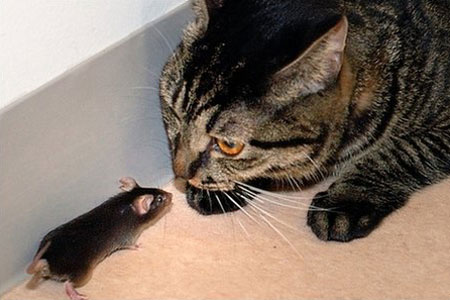Why are mice afraid of cats?
Cats, rats and other predators emit a chemical signal that causes fear in mice.

Photo: AP.
The BBC said that scientists from Scripps Research Institute in La Jolla, California, have discovered that mice and possibly other mammals develop receptors that receive chemical signals. from other species. Therefore, mice will have a fearful reaction when they detect some of the specific proteins found in cat's saliva and urine of rats.
These proteins, called Mup, affect cells in a sensory organ especially in mice called the olfactory organ in the palate. The olfactory organ in the palate contains neurons that recognize those proteins. This organ is connected to areas related to memory, emotions, and release of hormones in the brain. In many mammals, this is a pheromone recognition body (chemical signal containing information between individuals of the same species). These pheromones can directly affect animal behavior.
But in the latest study, scientists found that the neurons in the palate olfactory organ in mice were also stimulated by chemical signals from predators. The proteins cause mice to have fearful expressions like immobilization or lying close to the ground as they sniff and probe around.
Lead researcher Lisa Stowers said the finding is extremely important. Once the animal has developed a Mup protein receptor, the original genes can also develop new receptors that recognize proteins from other animals. That will help them avoid being eaten.
However, what surprised Stowers was the results of her experiment when she and her team activated the palate olfactory organ in mice and exposed them to an alive rats but were anesthetized. Because Mup protein cannot be identified, mice that once faced rats do not show any fear at all, even though they still see the rat in front of them.
Stowers said: 'A lab rat rolled himself to sleep next to the rat. We think it loses the fear of rats. '
- Fearful cats flee the mouse on the street
- It turned out not to keep cats as mice
- Rats respond to panic cat regress
- Li explained the phenomenon of cat fear ... cucumber is causing fever
- Why do cats like to quit 'booty' home?
- The mice are not afraid of cats
- Rodents are like cats
- The 'strange' cats in the world
- Mice no longer fear cats when infected with parasites
- The mole rats eat the mouse rat manure to get instructions for raising children
- The mouse-cat strange creature made the South African people afraid
- The strange cat loves swimming and catching fish well in Vietnam
 'Fine laughs' - Scary and painful torture in ancient times
'Fine laughs' - Scary and painful torture in ancient times The sequence of numbers 142857 of the Egyptian pyramids is known as the strangest number in the world - Why?
The sequence of numbers 142857 of the Egyptian pyramids is known as the strangest number in the world - Why? History of the iron
History of the iron What is alum?
What is alum? Surprising discovery: How much to eat to increase longevity the most?
Surprising discovery: How much to eat to increase longevity the most?  Science has found a mechanism to help the brain turn experiences into long-term memories, you can also try it
Science has found a mechanism to help the brain turn experiences into long-term memories, you can also try it  Discovering a therapy to create a 'super-strong' body, increasing life expectancy by 33%
Discovering a therapy to create a 'super-strong' body, increasing life expectancy by 33%  Is it possible to reverse the aging process, dissolving all human diseases in the future?
Is it possible to reverse the aging process, dissolving all human diseases in the future?  Gulls devour rats on the street in a single note
Gulls devour rats on the street in a single note  Why are white mice found all over the world?
Why are white mice found all over the world? 